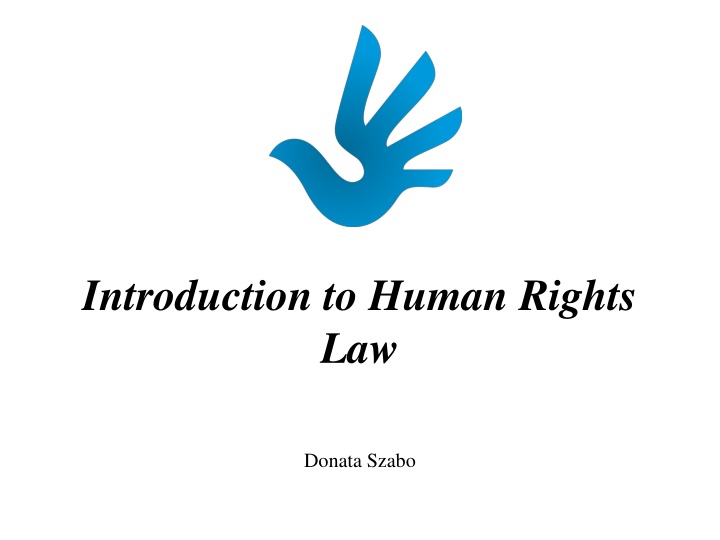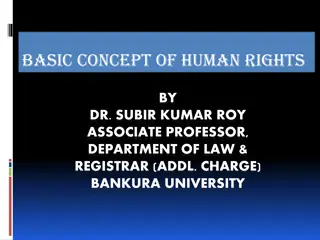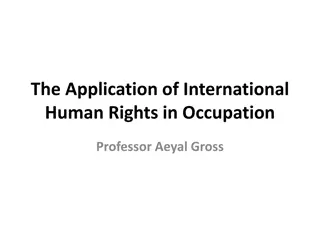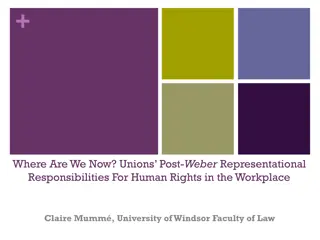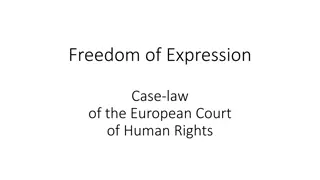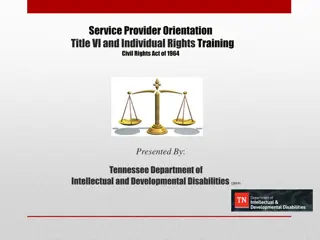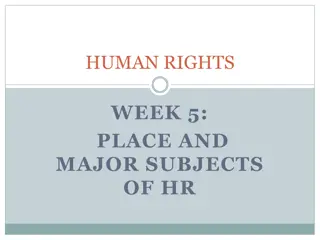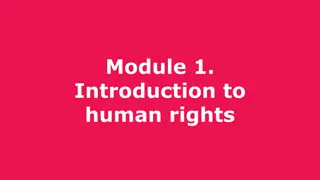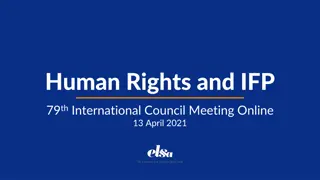Overview of Human Rights Law and Conventions
This content provides an introduction to human rights law, lists some prominent human rights, explores international human rights conventions, discusses national Bills of Rights, and outlines the structure of treaties. It covers fundamental rights encompassing equality, life, freedom, and more, along with various international human rights agreements and national frameworks.
Download Presentation

Please find below an Image/Link to download the presentation.
The content on the website is provided AS IS for your information and personal use only. It may not be sold, licensed, or shared on other websites without obtaining consent from the author.If you encounter any issues during the download, it is possible that the publisher has removed the file from their server.
You are allowed to download the files provided on this website for personal or commercial use, subject to the condition that they are used lawfully. All files are the property of their respective owners.
The content on the website is provided AS IS for your information and personal use only. It may not be sold, licensed, or shared on other websites without obtaining consent from the author.
E N D
Presentation Transcript
Introduction to Human Rights Law Donata Szabo
Right to equality Freedom from discrimination Right to life Freedom from torture Freedom from slavery Personal liberty Right to a fair trial No punishment without law Freedom from interference with privacy, family, home & correspondence Freedom of religion and belief Freedom of expression Freedom of assembly etc.
Do you know any international human rights conventions? Universal Declaration of Human Rights 1948 Genocide Convention 1948 European Convention on Human Rights 1950 Convention relating to the Status of Refugees 1951 European Social Charter 1961 International Covenant on Civil and Political Rights 1966 International Covenant on Economic, Social and Cultural Rights 1966 International Convention on the Elimination of All Forms of Racial Discrimination 1969 American Convention on Human Rights 1969 Convention on the Elimination of All Forms of Discrimination against Women 1979 Convention against Torture 1984 African Charter on Human and Peoples Rights (Banjul Charter) 1986 Convention on the Rights of the Child 1989 Indigenous and Tribal Peoples Convention 1989 Charter of Fundamental Rights of the European Union 2000 Arab Charter on Human Rights 2004 Convention on the Rights of Persons with Disabilities 2006 International Convention for the Protection of All Persons from Enforced Disappearance 2007
In addition to international and regional instruments, many states have adopted their own national Bill of Rights E.g. USA in 1789 A Bill of Rights contains a list of fundamental human rights and guidance about bringing human rights complaints, litigation and enforcement Does your country have a Bill of Rights ? Does it contain any human rights you think are unique to your country?
Structure of treaties NB this is a general structure; there may be smaller differences between individual treaties but they tend to follow a very similar pattern Example: International Covenant on Civil and Political Rights (169 ratifications, 6 more signatories) Preamble Part I Article 1: right of self-determination Part II Article 2: undertaking by States to protect human rights without discrimination Article 3: equality of men and women Article 4: public emergency derogations Article 5: no destruction of human rights; adding of additional national rights Part III Articles 6-27: List of rights Part IV Articles 28-45: Human Rights Committee provisions Part V Compliance with UN Charter Part VI Ways to join and administrative provisions
Absolute vs. limited vs. qualified rights Best layout of this is found in the European system Absolute rights can never be restricted, i.e. States must protect these rights to the fullest extent and can never justify any restrictions on them Examples: freedom from torture, inhuman or degrading treatment; freedom from slavery; right to hold a religious or non-religious belief Limited rights can be restricted but only in very specific circumstances; e.g. to protect the rights of others Examples: personal liberty can be restricted if a person is lawfully convicted of a criminal offence; right to life can be restricted in lawful acts of war Qualified rights can be restricted interfered with in the interests of the public or in order to protect other people s rights; it depends on the rights in question and the circumstances of each case which right will prevail in situations of conflict Examples: right to respect for private and family life; freedom to manifest one s religion or belief; freedom of expression; freedom of assembly Any limitations/restrictions on human rights (where allowed) must be justified by showing that: The interference is prescribed by law; The interference has a legitimate aim (e.g. public safety; prevention of crime, etc.; The interference is proportionate (i.e. nothing more than necessary) to the aim pursued
Compare absolute vs. qualified right text Prohibition of torture (Article 3 of ECHR) No one shall be subjected to torture or to inhuman or degrading treatment or punishment. Right to respect for private and family life (Article 8 of ECHR) 1. Everyone has the right to respect for his private and family life, his home and his correspondence. 2. There shall be no interference by a public authority with the exercise of this right except such as is in accordance with the law and is necessary in a democratic society in the interests of national security, public safety, or the economic well-being of the country, for the prevention of disorder or crime, for the protection of health or morals, or for the protection of the rights and freedoms of others.
Derogations/States of emergency States sometimes face situations of crisis, otherwise called a state of emergency Such times of crisis can be caused by civil war, natural disasters, etc. Basically, all major human rights instruments (international or regional) allow states to derogate from their obligations under the given treaty in times of crisis Derogation means that the state relieved from some of its obligations under the given treaty for the duration of the crisis NB non-derogable vs derogable rights! In order to be able to derogate from a treaty, states have to follow the procedure laid down in the treaty in question. E.g. in Article 4 of the ICCPR this includes: the official proclamation of a state of emergency and its expected duration the emergency has to threaten the life of the nation the derogatory measures cannot be more than those strictly required by the exigencies of the situation the measure must not be inconsistent with the state s other obligations under international law and must not involve discrimination solely on the ground of sex, race, colour, language, religion or social origin the state must inform the treaty body of the termination of the crisis Non-derogable rights are: right to life (NB exceptions within right) (Article 6); freedom from torture (Article 7); freedom from slavery (Article 8, paras 1-2); imprisonment for mere failure to fulfil a contractual obligation (Article 11); prohibition of retrospectivity (Article 15); right to be recognised as a person before the law (Article 16); freedom of thought, conscience and religion (Article 18)
Who hears human rights complaints? International treaty bodies : International Court of Justice (ICJ) International Criminal Court (ICC) UN Commission on Human Rights Human Rights Committee (ICCPR) Committee on Economic, Social and Cultural Rights (ICESCR) Committee Against Torture (CAT) Committee on the Elimination of Racial Discrimination (CERD) Etc. Regional bodies: European Court of Human Rights (based in Strasbourg, France) European Committee of Social Rights (based in Strasbourg, France) African Court on Human and Peoples Rights (based in Arusha, Tanzania) African Commission on Human and Peoples Rights (based in Banjul, Gambia) Inter-American Commission on Human Rights (based in Washington DC, USA) Inter-American Court of Human Rights (based in San Jos , Costa Rica) (Arab Human Rights Committee (no complaints mechanism; only State reports)) (ASEAN Intergovernmental Commission on Human Rights) Domestic courts
Civil and political vs. socio-economic rights Some argue that economic, social and cultural rights are different from civil and political rights and that they should not even be viewed as human rights in the same sense Examples of civil and political rights: freedom from torture, right to a fair trial Examples of socio-economic rights: right to social security, right to adequate standard of living Historically, during the Cold War, the West emphasised civil and political rights, while the Eastern bloc preferred socio-economic rights hence the adoption of two different covenants: the ICCPR and the ICESCR There is no strict separation anymore Socio-economic rights have been seen to require large investments from the state, while civil and political rights only oblige states to refrain from interfering with human rights Socio-economic rights have been argued to be non-justiciable (i.e. not capable of being settled by court action) due to difficulties with interpretation of what exactly is required of the state In fact, both types of rights require both investment and refraining from interference
Common law rights Some fundamental rights now contained in major human rights instruments have their origins in e.g. the common law (otherwise called civilliberties ) Examples include: the writ of habeas corpus (protection against unlawful imprisonment and right to appeal); right to property; right to liberty; right to strike Magna Carta 1215 (containing the foundations of many common law rights) is often regarded as the first human rights instrument
Human Rights Act 1998 in the United Kingdom The UK implemented the ECHR into its domestic law by the adoption of the Human Rights Act 1998 making the ECHR directly applicable and enforceable in the UK (e.g. courts must consider European case law, legislation must be in compliance with human rights principles) The Act simplified complaints to the European Court of Human Rights (individuals can directly petition to the Court from the UK) Current controversies surround the argument that the Act is not a true, holistic reflection of British views on rights and therefore a British Bill of Rights should be adopted There is also discussion about the UK withdrawing from the European human rights framework (i.e. the ECHR) but this is quite unlikely at the moment
Scenarios for discussion Points to think about: Which human rights are involved? Do you think they were violated? Why? Why not? What would be the solution to the interference (if any)? At which treaty body can the individual concerned bring a case?
Scenario 1 Erika is working for National Rail in the UK. Her job is quite demanding and often requires her to work out of hours. She has been in her current position for 5 years and her supervisor has always been very satisfied with her work. Erika recently found out she s pregnant. As she has complications with her pregnancy she had to take a few days off work on an ad hoc basis. One morning, her supervisor informed her that she would be dismissed due to her unreliability and frequent absence recently. Advise Erika. Scenario 2 Mohamed lives in Diyarbakir, Turkey. His brother has been missing for a few months which is very much unlike him. Mohamed went to the police to file a missing person s report and was told that the police would start an investigation into his brother s disappearance. As he did not hear any updates from the police for many weeks, he telephones them to ask for an update. He is told that his brother is suspected to be a member of the PKK (Kurdistan Workers Party), an organisation illegal in Turkey. He does not get any updates about his brother s whereabouts or the progress of the investigation.
Quiz 1. What is the African regional human rights treaty called? 2. Where is the seat of the European Court of Human Rights? 3. Which human rights treaty has the highest number of ratifications? 4. Which document is regarded as the most basic human rights instrument? When was it written? Why? 5. Name an absolute right. 6. What is a qualified right? Give an example. 7. What is the difference between derogation and limitation? 8. List at least 8 fundamental human rights. 9. Which treaty body hears complaints about the violations of the ICCPR? 10. Give an example of a right that was well-established even before the introduction of modern human rights frameworks? 11. What is a Bill of Rights ? 12. Why is the status socio-economic rights controversial? 13. Which regional human rights framework is the oldest and regarded as the most developed? 14. Name at least 3 international human rights treaties. 15. Which human rights body has its seat in San Jos , Costa Rica?
